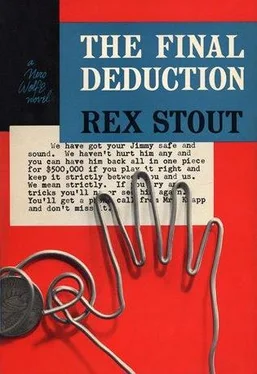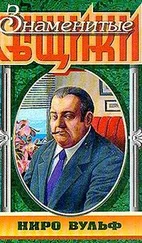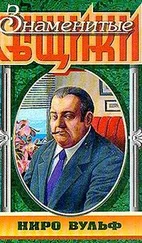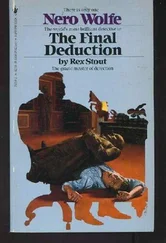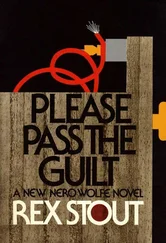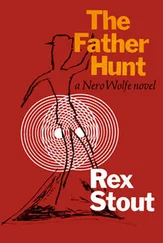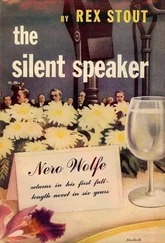“How did you know the suitcase was in it?”
“I carried it out for her and put it in the trunk. I saw her with it upstairs and offered to take it. She didn’t tell me where she was going, and I didn’t ask her. I thought something was wrong, but I didn’t know what. I thought she was probably going wherever Jimmy was. He had been gone since Sunday, and I didn’t think he was at Katonah, and my sister hadn’t told us where he was.” Purcell shook his head. “So Dinah typed the notes, and so she took the typewriter. I’ve got to thank you for telling me. So you’re right about her, and I thought I knew her. You know, I was playing gin with her a week ago Thursday — no, Friday — and of course she had it all planned then. That’s hard to believe, but I guess I’ve got to believe it, and I can see why you want to know about her friends. If I could tell you I would. Is it all right to tell my sister about her typing the notes?”
“Your sister has probably already been told by the police.” Wolfe palmed the chair arms. “You haven’t been much help, Mr. Purcell, but you have been candid, and I appreciate it. Mr. Tedder should thank you, and no doubt he will. I needn’t keep you any longer.”
“But you were going to explain about someone putting something in Jimmy’s drink.”
“So I was. Wednesday evening in the library. You were there.”
“Yes.”
“You served brandy to Mr. Frost.”
“Yes, I believe I did. How did— Oh, Noel told you.”
“No, his sister told me. I had the idea of trying to get from her who could, and who could not, have drugged Mr. Vail’s drink, but abandoned it. Such an inquiry is nearly always futile; memories are too faulty and interests too tangled. The point is simple: Mr. Vail must have been drugged when he was pulled off the couch and across to the statue, therefore someone put something in his drink. That’s the explanation.”
The reaction to that was perceptible. Purcell stared, not blinking. “Pulled?” he asked. “You said pulled?”
“Yes.”
“But he wasn’t pulled. Unless you mean he pulled himself.”
“No. He was unconscious. Someone pulled him across to the statue, to the desired spot, and pushed the statue over on him. I’m not going to elaborate on that, not now, to you; I mentioned it only because I felt I owed you an explanation of Mr. Tedder’s remark about Mr. Vail’s drink.”
“But you’re saying Jimmy was murdered.”
“Yes.”
“But the police don’t say he was.”
“No?”
“But you didn’t tell Noel that.”
“But I did.”
“You told Noel Jimmy was murdered?”
“Yes.”
“You don’t know that. You can’t.”
“The word ‘know’ has various connotations. I have formed that conclusion.”
“Then you didn’t really — you don’t care about Dinah Utley. You’ve been taking advantage of me.” His cheeks were red. “You’ve been making a fool of me.” He got to his feet. “Noel should have told me. That wasn’t fair. You should have told me too. I guess I am a fool.” He turned and headed for the door.
I stayed in my chair. There are times when it’s better to let a departing guest get his own hat and open the door for himself. When I heard it close I went to the hall to see that he had remembered to cross the sill before he shut it, then went back to my desk. Wolfe had straightened up and was making faces.
“If he’s it,” I said, “if he’s not a fool, you might as well cross it off.”
He made another face.
I have never completely understood Wolfe’s attitude on food and eating and probably never will. In some ways it’s strictly personal. If Fritz presents a platter of broiled squabs and one of them is a little plumper or a more beautiful brown than the others, Wolfe cops it. If the supply of wild thyme honey from Greece is getting low, I am given to understand, through Fritz, that plain American honey on griddle cakes is quite acceptable. And so on. But it really pains him if I am out on a prolonged errand at mealtime because I may insult my palate with a drugstore sandwich, and, even worse, I may offend my stomach by leaving it empty. If there is reason to believe that a caller is hungry, even if it is someone whom he intends to take apart, he has Fritz bring a tray, and not scraps. As for interruptions at meals, for him there is absolutely nothing doing; when he is once in his chair at the table he leaves it only when the last bite of cheese or dessert is down. That’s personal, but he has tried off and on to extend it to me, and he would if I would stand for it. The point is, does he hate to have my meal broken into because it interrupts his, or because it interrupts mine, or just on general principles? Search me.
Anyhow, he does. So when the phone rang while I was helping myself to another beef fillet, and Fritz answered it and came to say that Mrs. Vail wished to speak to Mr. Wolfe, and I pushed back my chair to go, Wolfe growled and glowered. He didn’t tell me not to go, because he knew I would go anyway.
When I told our former client that Wolfe was at dinner and said he could call her back in half an hour, she said she wanted to see him. Now. I said okay, if she left in ten minutes he would be available when she arrived, and she said no, she couldn’t come, she was worn out, and she sounded like it.
“That narrows it down,” I told her, “if it’s too private for the phone. Either I come there and get it and bring it back, or let it wait.”
“It mustn’t wait. Doesn’t he ever go anywhere?”
“Not on business.”
“Can you come now?”
I glanced at my wrist. “I can be there by nine o’clock. Will that do?”
She said she supposed it would have to, and I returned to the dining room and my place and asked Fritz to bring my coffee with my pie. The routine is back to the office for coffee because that’s where the one and only chair is, and Wolfe’s current book is there if I’m going out. When he had finished his pie and put his fork down, I said I was going to call on Mrs. Vail by request and asked for instructions.
He grunted. “Intelligence guided by experience. You know the situation. We owe her nothing.”
I went. Having gone out to the stoop to feel the weather and decided I could survive without a coat, I walked to Eighth Avenue and got an uptown taxi. On the way uptown I looked it over. Wolfe’s statement that I knew the situation left out something: I knew it from my angle, but not from his. He might already have made some deduction, not final; for instance, that Noel Tedder was a kidnaper, a murderer, and a liar. Or sister Margot, or Uncle Ralph. It wouldn’t be the first time, or even the twentieth, that he had kept a deduction to himself.
Noel must have been waiting in the hall, for two seconds after I pushed the button he opened the door. He did own some regular clothes — a plain dark gray suit, white shirt, and gray tie, but of course he might have bought them for the funeral. He shut the door, turned to me, and demanded, “Why the hell did Wolfe tell Uncle Ralph that Jimmy was murdered?”
“You may have three guesses,” I told him. “Mine is that he had to, since you had told Uncle Ralph that someone had put something in Jimmy’s drink and Mr. Wolfe would explain it. Did you have to mention Jimmy’s drink?”
“No. That slipped out. But what the hell, if Wolfe’s so damn smart couldn’t he have dodged it?”
“Sure he could. As for why he didn’t, sometimes I know why he does a thing while he’s doing it, sometimes I know an hour later, sometimes a week later, and sometimes never. Why, did Purcell tell your mother?”
“Certainly he did. There’s hell to pay.”
Читать дальше
